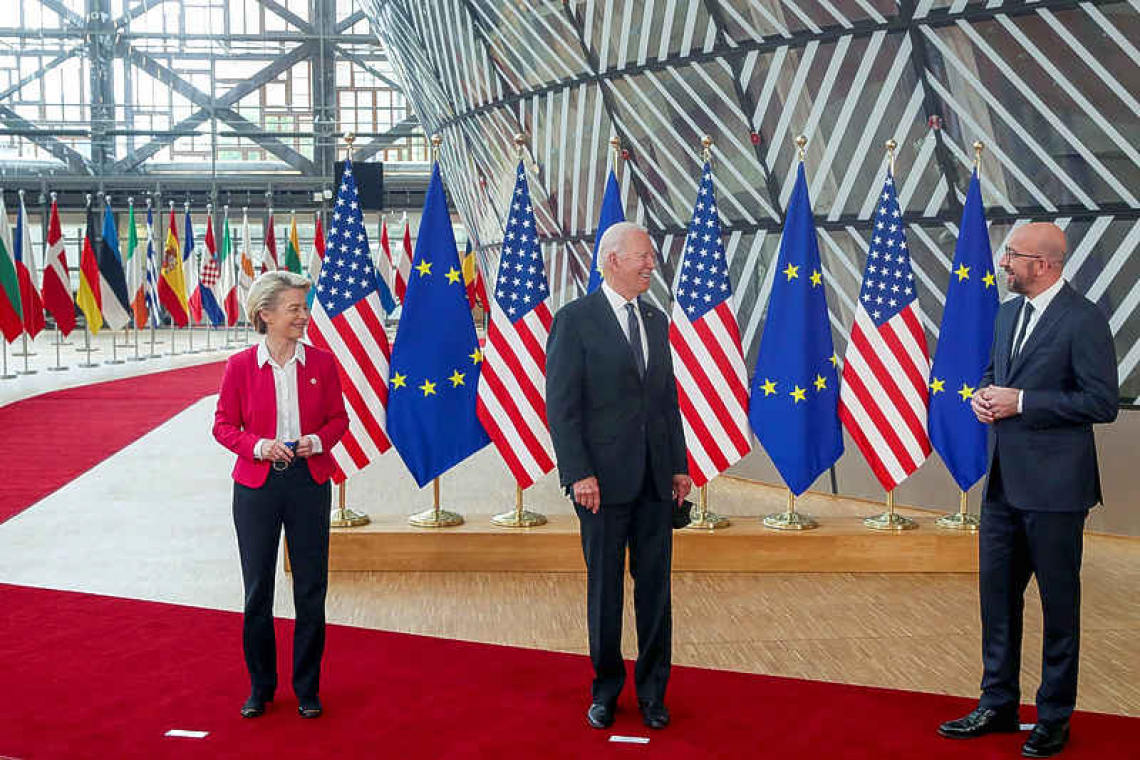BRUSSELS--U.S. President Joe Biden ended one front in a Trump-era trade war when he met European Union leaders on Tuesday by agreeing a truce in a transatlantic dispute over aircraft subsidies that had dragged on for 17 years.
The EU also lifted its tariffs on U.S. steel and aluminium for six months in the hope that the United States will do the same for Europe.
Quoting Irish poet W. B. Yeats at the start of his first EU-U.S. summit as president, Biden also said the world was shifting and that Western democracies needed to come together. "The world has changed, changed utterly," Biden, an Irish-American, said, citing from the poem Easter 1916, in remarks that pointed towards the themes of his eight day trip through Europe: China, the COVID-19 pandemic and climate change.
Sitting at an oval table in the EU's headquarters with U.S. cabinet officials, Biden told EU institution leaders that the EU and the United States working together was "the best answer to deal with these changes" that he said brought "great anxiety".
He earlier told reporters he had very different opinions from his predecessor. Former president Donald Trump also visited the EU institutions, in May 2017, but later imposed tariffs on the EU and promoted Britain's departure from the bloc.
"I think we have great opportunities to work closely with the EU as well as NATO and we feel quite good about it," Biden said after walking through the futuristic glass Europa Building, also known as "The Egg", to the summit meeting room with EU institution leaders.
"It's overwhelmingly in the interest of the USA to have a great relationship with NATO and the EU," he said, accompanied by European Commission chief Ursula von der Leyen and the EU's chairman Charles Michel, who represents EU governments. The EU and the United States are the world's top trading powers, along with China, but Trump sought to sideline the EU.
Biden also repeated his mantra: "America is back" and spoke of the need to provide good jobs for European and American workers, particularly after the economic impact of COVID-19. He spoke of his father saying that a job "was more than just a pay-check" because it brought dignity.
He is seeking European support to defend Western liberal democracies in the face of a more assertive Russia and China's military and economic rise. Biden and U.S. Secretary of State Anthony Blinken earlier met with Belgian King Philippe, Prime Minister Alexander De Croo and Foreign Minister Sophie Wilmes in Brussels' royal palace. Biden will meet Russian President Vladimir Putin on Wednesday in Geneva.
"We're facing a once in a century global health crisis," Biden said at NATO, while adding "Russia and China are both seeking to drive a wedge in our transatlantic solidarity."
NATO leaders for the first time said on Monday China's military rise presented "systemic challenges". China's diplomatic mission to the EU on Tuesday called on NATO to "stop hyping up in any form the so-called China threat," and accused the alliance of "slandering China's peaceful development".
Biden and the EU side agreed to remove tariffs on $11.5 billion of goods from EU wine to U.S. tobacco and spirits for five years. The tariffs were imposed on a tit-for-tat basis over mutual frustration with state subsidies for U.S. planemaker Boeing and European rival Airbus.
Both sides committed to provide financing to their large civil aircraft producers on market terms and not to fund research in a way that would harm one another. "I am happy to see that after intensive work between the European Commission and the U.S. administration, our transatlantic partnership is on its way to reaching cruising speed," von der Leyen said.
In a reference to China, Washington and Brussels will "collaborate on addressing non-market practices of third parties that may harm their respective large civil aircraft industries".
While Airbus and Boeing have factories in China, they accuse Beijing of massive state subsidies to try to develop rival passenger aircrafts, China's home-built C919 jets.
However, Washington did not commit to ending another row over its punitive tariffs related to steel and aluminium, as the EU has demanded. The EU has now suspended its countermeasures for six months, von der Leyen said, effectively giving Washington a December deadline to remove its Trump-era duties. "Let's sort out, within this time period, how we can get rid of this nuisance," von der Leyen told reporters.
Resolving the steel conflict gives both sides more time to focus on concerns over China's overproduction of metals, diplomats said.







